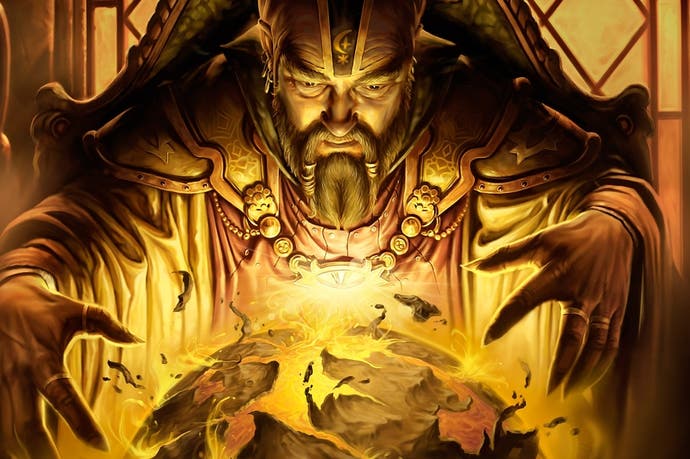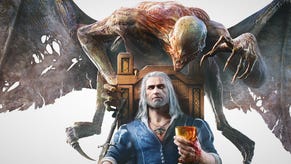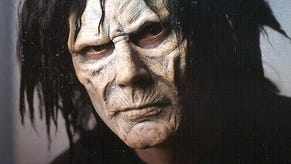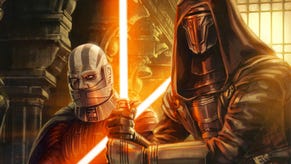Neverwinter Nights retrospective
Fitful.
Ten years later, I'm still torn. I can't tell you if I enjoyed Neverwinter Nights. I don't know whether to say that it was my first great gaming disappointment, or tell stories about how its expansions, mods and custom content eventually formed something of a splint for a broken promise.
Neverwinter Nights was supposed to be a great step forward for RPGs and the next masterpiece from BioWare, the developer who created the wondrous Baldur's Gate series. Yet for all the hours I put into this game I have few memories and little enthusiasm. I'm struck by my own indifference.
It was supposed to give us everything. I don't know about you, but I began to believe that and so did everyone I spoke to. The gaming press believed it before its release, at its release (evidenced by a slew of ecstatic reviews, though Eurogamer didn't follow suit) and, in some cases, for quite some time after its release.
In comparison, my mood switched from keen to baffled to frustrated and, for the first time, I began to look at some of my games journalist colleagues through narrowed eyes. I seriously wondered what these people had been playing, because it certainly wasn't the same thing that had landed on my desk.
By the turn of the century, all us PC owners were accustomed to sliding 3D cards into our machines and come 2002 I don't think there was anyone among us who wasn't on their second or third card. BioWare wanted to exploit this technology as much as any of the ubiquitous first-person shooters that swarmed the market and so it put its popular Infinity Engine to bed. Lush as its rendered backgrounds were, there was no room now for 2D or isometric RPGs.
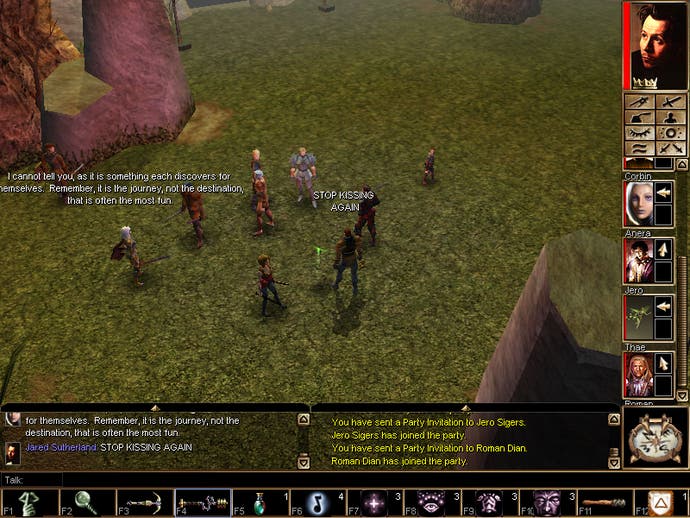
In its place, the Aurora engine would provide a full 3D experience, allowing players to zoom, pan and glide their way around a new game world populated by polygons. Furthermore, Aurora would come with its own toolset, giving gamers the chance to create new environments, new dungeons and new adventures for one another, even letting us role-play together, one player taking the role of the Dungeon Master, guiding the other players and shaping the world about them. It was this, most of all, that would be our great step forward.
But Neverwinter Nights stumbled. The game paid a terrible price for its technology. Once I was able to squeeze my way through all the hype and marketing and reach for a copy, I found myself with a game that was as bland as a baked potato. While BioWare had indeed given its new game a full 3D engine with all sorts of real-time lighting effects, it had forgotten to include that which had made its earlier titles so rich, engaging and endearing. It had forgotten to give it personality.
In spite of all its dialogue, Neverwinter Nights wasn't particularly witty. For all its engine effects, it wasn't particularly pretty. For all the work that had gone into building the game world, it wasn't particularly distinctive and it certainly didn't feel anywhere near as big and as varied as anything BioWare had built before. Instead, it just felt slow and often rather lonely, since the party dynamic that had brought both variety and character to the Baldur's Gate games had been given the chop.
Much of the blandness was also due to the identikit nature of the in-game levels, which helped turn the game into Prefab Fantasy Land. The same layouts, models and textures would recur again and again and while BioWare's previous RPGs had occasionally re-used interiors, the repetition in Neverwinter Nights was all the more distinctive thanks to Aurora's relative lack of detail. The Forgotten Realms, a world of high drama and higher fantasy, had somehow become flat and uniform.
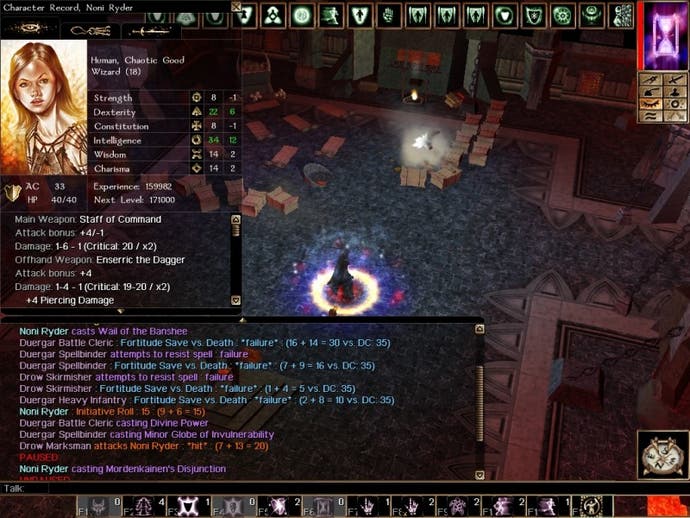
This was compounded by the custom content that players began to create and share with one other using a tile-based toolset much less powerful than they'd first expected. Pub layouts became oddly familiar, dungeons displayed remarkably similar rectangular designs and there were only so many flagstones and features to cover the walls with. But most disappointing of all, certainly for someone like me, was Neverwinter Nights' claim that it would give players the chance to truly role-play together, giving their Dungeon Master an interface through which they could tell the game's story, control its cast and shape its environments.
While such things are pretty easy for players who are sat around a table and articulating a little imagination or exercising a little improvisation, in the Aurora toolset it became a plodding process of sometimes fiddly radial menus that I gradually began to see as the seven circles of hell. Nothing was quick or easy because, as so many DMs know, running any game is all about understanding context, improvising and adapting to change. This wasn't an interface that allowed a DM to be flexible, to quickly make a decision, add to, or alter something already in the game. Copious pausing and calls for patience were the order of the day.
Neverwinter Nights had something of a small victory when it came to its accessibility compared to BioWare's previous RPGs. It introduced gamers to Third Edition Dungeons & Dragons rules, the Second Edition rules going the same way as the Infinity Engine. The Second Edition was always a curious thing to try to understand even outside of the context of a computer game, but the Third Edition system presented mechanics that were much more logical and consistent, not least because it was mostly about adding numbers to other numbers in the hope of achieving a bigger, better number.
The game's real saving would come later with the release of two expansions, Shadows of Undrentide and Hordes of the Underdark, and what was one of the earliest DLC collections, the Premium Modules. Among its offerings, the first expansion added much needed tile-sets, scripting tools and more playthings, while the second was widely praised for featuring a single-player campaign that was far more involving than the seemingly endless series of fetch quests that described the main game. Finally, Neverwinter Nights was worthwhile, just as long as you were willing to pay a little more.
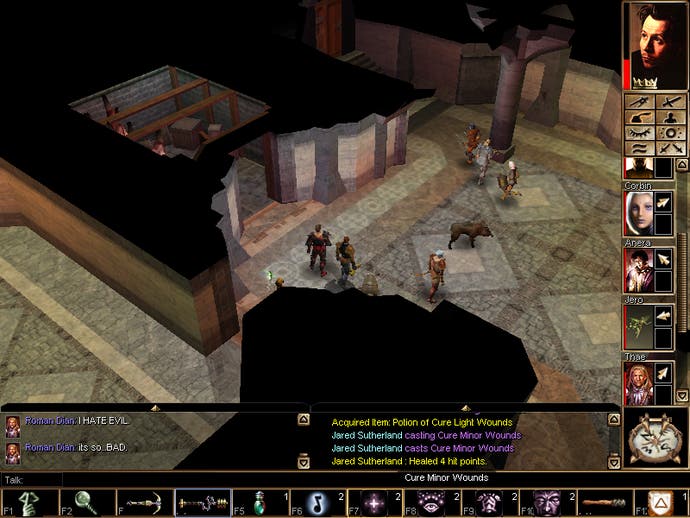
Many of us later said that the game was the victim of its own ambition. It was too big. It lacked detail. It would never be able to live up to its claims and that trying to run anything as complex as a worthwhile role-playing session within the constraints of a game engine was bound to fail. But none of these admissions made me any less disappointed.
Funnily enough, the happiest memories I have, sparse as they may be, are of players doing their best to try to demonstrate the creativity and ambition that the game said it would encourage, but doing that outside of the framework it provided, repeatedly bending and sometimes breaking Neverwinter Nights with unofficial mods and tweaks.
In time, miniature MMO servers began to appear online. While we were used to most servers hosting short, specific games for small teams of players, these often had space for scores of gamers and were modded to add unsupported features and to always remain online. DMs dropped in and out at will to watch over players as they adventured through custom-built locations that would auto-spawn monsters and rewards.
Between creating custom quests or awarding experience points for role-playing, these DMs would occasionally lament how the game wasn't designed to cater for dozens upon dozens of players dashing about on strained servers that would frequently buckle under the demand, but they still ran the things and we still joined them. It didn't really matter that they didn't quite work, that they didn't quite fulfil their promise, since as far as us role-players were concerned, neither did Neverwinter Nights.
